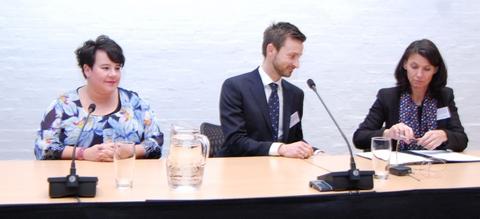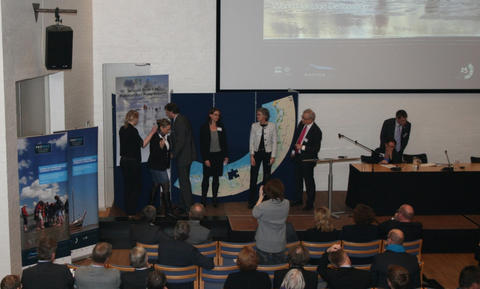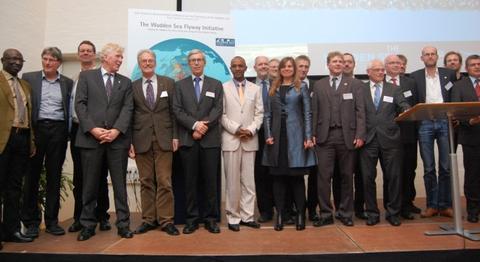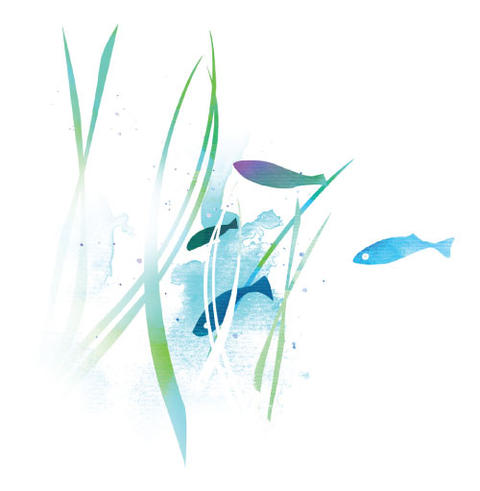
12th Trilateral Governmental Conference in Tønder, Denmark
The Conference has been the 12th since the cooperation between the governments of the three Wadden Sea countries, started in 1978, with the aim to protect and manage the Wadden Sea as one shared nature area of international importance.

The Dutch Minister of Agriculture Sharon Dijksma, the Deputy Permanent Secretary of the Danish Ministry of the Environment Mikkel Aarøe-Hansen and the German State Secretary for the Environment Rita Schwarzelühr-Sutter.
The Conference was chaired by the Deputy Permanent Secretary of the Danish Ministry of the Environment Mikkel Aarøe-Hansen, the Dutch Minister of Agriculture Sharon Dijksma, the German State Secretary for the Environment Rita Schwarzelühr-Sutter and her colleagues from the German Länder, Robert Habeck, Minister for Energy Transition, Agriculture, Environment and Rural Areas, Schleswig-Holstein, Stefan Wenzel, Minister for Environment, Energy and Climate Protection, Lower-Saxony, and Jutta Blankau, Senator for Urban Development and Environment, Hamburg.
Another important conference issue was the adoption of a joint strategy for “Sustainable Tourism in the Wadden Sea World Heritage Destination”, which was approved by the ministers as an Annex to the Council Declaration. In additon,the strategy was signed at the Conference by all relevant stakeholders such as tourism organizations, local governments, nature conservation organizations and green NGOs. The strategy has been developed on the request of the World Heritage Committee in a participatory approach and is a milestone in the Wadden Sea Cooperation. A solid transnational network of stakeholders has been established over the last two years that will be continued and provide the framework for the implementation of the joint strategy.

Signing event of the Sustainable Tourism Stategy
The transnational tourism strategy, which has been developed within the PROWAD project and co-financed by the INTERREG IVB North Sea Region Programme, will contribute to maintain the “Outstanding Universal Value" of the Wadden Sea World Heritage and at the same time provide benefits for the people living in the region (download strategy). A strong ‘Wadden Sea World Heritage Destination’ and World Heritage Brand will enable regional and local tourism brands to raise their profile nationally and internationally through a coherent communication and marketing strategy (download brand paper).
Another milestone was the signing of the Flyway Vision developed by the Wadden Sea Flyway Initiative (WSFI). Yearly up to 12 million birds pass the Wadden Sea when commuting between breeding in the Arctic and wintering in Africa. Governments and organizations along the whole flyway, cooperating on the conservation of migratory birds signed, an agreement to collaborate on protecting the flyway as a common heritage, connecting countries and people in a festive procedure during the conference. The adoption of a climate adaptation strategy was a further highlight of the event. The aim of the strategy is to increase the resilience of the Wadden Sea to climate change and to secure the safety of the inhabitants, while maintaining the natural qualities of the Wadden Sea.

Signatories of the WSFI Flyway Vision
Manifold activities took place around the meeting of ministers. An exhibition in the Ecco Conference Center was presented to the public. Organizations from the Wadden Sea Region displayed interesting aspects of their field of work, ranging from school programmes to results from scientific activities. Preceding the ministerial meeting, an interesting panel discussion between ministers, representatives from organizations and the audience was held. The intense exchange was under the theme “Protect and prosper – Outstanding universal values and sustainable development in the Wadden Sea”. The discussion was well introduced by James Rebanks, who has investigated how World Heritage properties have been able to benefit from being on the World Heritage List from which also the Wadden Sea could learn.

